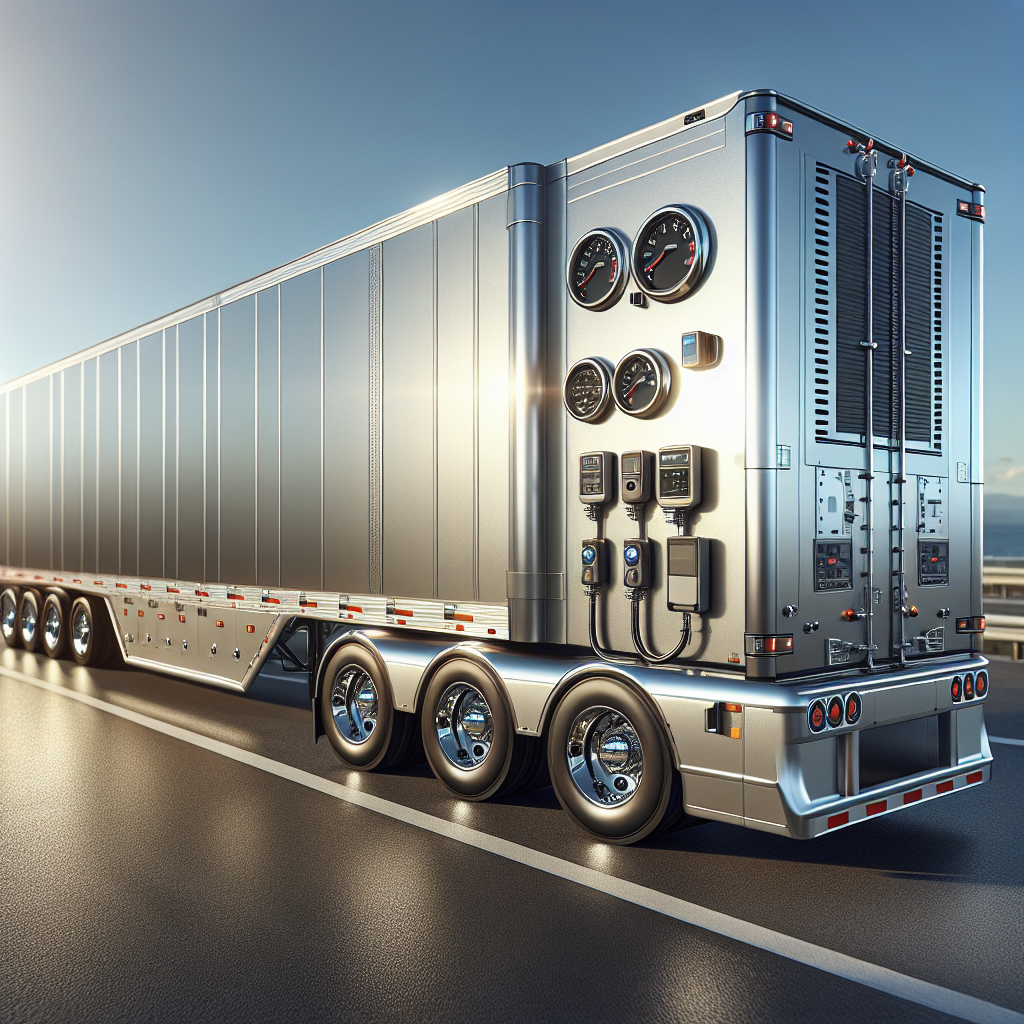

Ensuring the safety of your trailer on the road is paramount, not only for the driver but also for other road users. Trailer safety devices play a crucial role in preventing accidents and enhancing the overall safety of trailer operations. These devices, particularly those related to the braking system, are designed to reduce the risk of catastrophic failures that could lead to severe accidents.
One of the key aspects of trailer safety devices is their ability to monitor vital parameters such as brake temperature, axle temperature, and tire pressure. By keeping track of these metrics, drivers can receive early warnings of potential issues, allowing them to take corrective actions before a situation escalates. Here are some significant benefits of incorporating safety devices into your trailer:
- Enhanced Control: Safety devices improve the responsiveness of the braking system, ensuring that the trailer stops effectively when needed.
- Real-time Monitoring: Continuous data collection helps in maintaining optimal performance and alerts users to any irregularities.
- Reduced Maintenance Costs: Identifying issues early can prevent costly repairs and downtime.
Moreover, the implementation of a smart trailer monitoring system can significantly elevate safety standards. By transforming any trailer into a smart trailer, you gain access to vital information that empowers you to drive more confidently.
To ensure your trailer is equipped with the latest safety technology, tow with peace of mind, knowing that trailerwatchdog is standing guard. Visit trailerwatchdog.com to learn more about our cutting-edge solutions for trailer safety.
Types of Safety Devices for Trailer Braking Systems

When it comes to enhancing the safety of trailer braking systems, various types of safety devices are available, each designed to address specific concerns and improve overall performance. Understanding these devices can help trailer owners make informed decisions about which systems to integrate into their vehicles. Here are some of the most common types of safety devices for trailer braking systems:
- Electronic Brake Control Modules: These modules regulate the trailer's brakes in response to the tow vehicle's braking action. They ensure that the trailer brakes are applied in a synchronized manner, enhancing stability and control.
- Anti-lock Braking Systems (ABS): ABS prevents wheel lock-up during hard braking, which is particularly beneficial in slippery conditions. This system allows for better steering control and reduces the likelihood of skidding.
- Brake Away Systems: Designed to activate the trailer brakes if the trailer becomes disconnected from the tow vehicle, brake away systems are crucial for preventing runaway trailers and protecting other road users.
- Tire Pressure Monitoring Systems (TPMS): These systems continuously monitor tire pressure and temperature, alerting drivers to any abnormalities. Proper tire maintenance is essential for safe braking, making TPMS an invaluable addition.
- Axle Temperature Sensors: Monitoring axle temperatures helps prevent overheating, which can lead to brake failure. These sensors provide real-time data, allowing for timely interventions.
Each of these devices plays a vital role in enhancing the safety and functionality of trailer braking systems. Implementing a combination of these safety measures will contribute to a more secure towing experience.
How Anti-Lock Braking Systems Improve Safety

Anti-lock Braking Systems (ABS) are a significant advancement in vehicle safety technology, particularly for trailers. By preventing wheel lock-up during emergency braking situations, ABS enhances the driver's ability to maintain control over the vehicle. Here’s how anti-lock braking systems improve safety on trailers:
Protect your trailer
- Improved Steering Control: One of the primary benefits of ABS is that it allows drivers to steer while braking. When a driver applies the brakes too hard, traditional systems can cause the wheels to lock, making it difficult to maneuver. ABS rapidly pulses the brakes to prevent this lock-up, enabling the driver to maintain steering control during critical moments.
- Reduced Risk of Skidding: In slippery conditions, such as wet or icy roads, skidding can be a significant hazard. ABS helps to reduce skidding by modulating brake pressure, allowing the wheels to keep turning. This feature is crucial for maintaining stability and traction under challenging conditions.
- Enhanced Stopping Power: ABS optimizes the braking force applied to each wheel, ensuring that the maximum stopping power is achieved without sacrificing control. This is particularly important for trailers, which can often be heavier and more difficult to stop safely compared to lighter vehicles.
- Increased Driver Confidence: Knowing that the trailer is equipped with ABS can instill greater confidence in drivers, allowing them to react more calmly in emergency situations. This psychological benefit can lead to safer driving behaviors overall.
Incorporating Anti-lock Braking Systems into trailer braking setups significantly enhances safety, making it a vital consideration for trailer owners looking to minimize risks on the road.
The Role of Electronic Stability Control in Trailers
Electronic Stability Control (ESC) is a crucial safety device for trailer braking systems that significantly enhances the stability and control of towing vehicles. Its primary function is to prevent skidding and loss of control, particularly during sharp turns or sudden maneuvers. Here are some key roles that ESC plays in ensuring trailer safety:
- Real-Time Monitoring: ESC systems continuously monitor the movements of the towing vehicle and trailer. Using sensors, they assess factors such as wheel speed, steering angle, and lateral acceleration to detect any signs of instability.
- Automatic Brake Intervention: When the system identifies a potential loss of control, it can automatically apply the brakes to individual wheels. This targeted braking helps to correct the vehicle's path, reducing the risk of jackknifing or skidding.
- Enhanced Traction Control: ESC works in conjunction with traction control systems to optimize the grip of the tires on the road. By adjusting brake pressure and engine power, ESC can help maintain traction on slippery or uneven surfaces, ensuring that both the towing vehicle and trailer remain stable.
- Improved Driver Response: With ESC engaged, drivers can feel more secure, knowing that the system is actively working to maintain control. This added reassurance can lead to more composed driving, reducing the likelihood of overcorrecting or making sudden movements that could compromise safety.
Incorporating Electronic Stability Control into trailer setups is essential for enhancing road safety, providing peace of mind for drivers as they navigate various driving conditions.
Benefits of Trailer Brake Controllers for Safety

Trailer brake controllers are vital components that significantly enhance the safety of towing operations. These devices enable drivers to manage their trailer's braking system effectively, ensuring safer and more controlled stops. Here are several key benefits of using trailer brake controllers for safety:
- Enhanced Braking Control: Trailer brake controllers allow for proportional braking, meaning that the trailer's brakes can be adjusted based on the speed and braking force of the towing vehicle. This synchronization ensures smoother stops and reduces the risk of the trailer pushing against the tow vehicle.
- Reduced Stopping Distance: By providing instant and responsive braking, these controllers can substantially decrease the stopping distance when towing a trailer. This is especially critical in emergency situations where every fraction of a second counts.
- Customization for Load Conditions: Many modern brake controllers come with features that allow users to set the braking intensity based on the load of the trailer. This customization ensures optimal braking performance, whether hauling heavy equipment or lighter cargo, preventing unwanted skidding or loss of control.
- Increased Driver Confidence: Knowing that the trailer's braking system is actively controlled and responsive gives drivers an added sense of security. This confidence can lead to better decision-making on the road, allowing drivers to navigate challenging terrains and weather conditions more effectively.
- Compatibility with Safety Features: Trailer brake controllers often integrate seamlessly with other safety devices, such as Electronic Stability Control, enhancing overall towing safety. Together, these systems work to provide comprehensive protection against potential hazards.
In conclusion, installing a reliable trailer brake controller is a proactive measure that significantly boosts safety, ensuring that both the driver and cargo remain secure during transit.
Future Innovations in Trailer Braking Safety Technology

The landscape of trailer braking safety technology is evolving rapidly, driven by advancements in automation, connectivity, and data analytics. As the demand for safer towing experiences grows, innovative solutions are emerging to enhance the effectiveness and reliability of trailer braking systems. Here are some promising future innovations:
- Smart Brake Controllers: The integration of IoT (Internet of Things) technology into brake controllers will allow for real-time monitoring and adjustments based on driving conditions. These smart systems can communicate with the towing vehicle and adjust braking power accordingly, ensuring optimal performance in various scenarios.
- Predictive Analytics: Utilizing big data, predictive analytics can assess driving patterns and environmental conditions to anticipate braking needs. This technology will enable trailers to prepare for sudden stops or hazardous situations, enhancing overall safety.
- Autonomous Braking Systems: Future trailers may incorporate fully autonomous braking systems that engage automatically in response to potential collisions. By detecting obstacles and adjusting braking force without driver input, these systems could significantly reduce accident rates.
- Enhanced Connectivity: With advancements in vehicle-to-vehicle (V2V) and vehicle-to-infrastructure (V2I) communication, trailers can receive real-time information from surrounding vehicles and infrastructure. This connectivity will allow for more coordinated braking responses, further increasing safety on the road.
- Advanced Sensor Technology: The development of sophisticated sensors will enable trailers to monitor not only braking conditions but also tire health and axle temperatures. These sensors can send alerts to the driver, preventing potential failures before they occur.
As these innovations take shape, they promise to revolutionize the trailer braking safety landscape, making towing safer than ever before. Tow with peace of mind, knowing that trailerwatchdog is standing guard.




